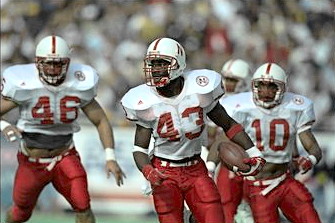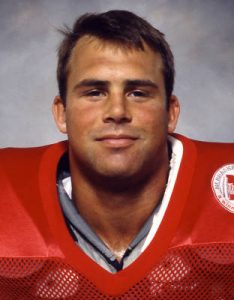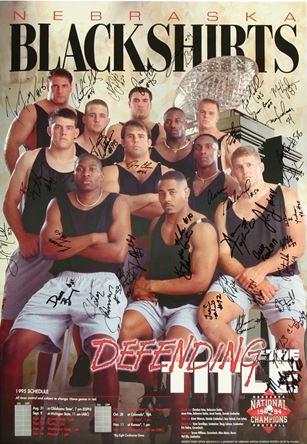Anatomy of an Era: Doug Colman, Part 2

Excerpted from Chapter 45, No Place Like Nebraska: Anatomy of an Era, Vol. 1 by Paul Koch
Anatomy of an Era: Doug Colman, Part 2
Doug Colman: (On joining the coaching profession) For me, I had that opportunity and went on and started doing the high school thing after the pros, and my next job after the freshman job was the assistant coaching job at a high school called Oak Crest. It was a big high school, it was a mixed group of kids as far as ethnic groups and I worked with another great group of guys. But we had a head coach who would not listen to any of his assistants, but decided how we were going to do things each week. We’d meet and meet and meet and discuss things, but it always came back to nobody else having a say in anything we did. And we didn’t win too many games. The following year I actually got hired as the Head Football Coach, and I interviewed all the assistants from the old staff and only ended up bringing one guy back, and had him coach the freshman team. And then I accumulated guys that I knew were good character guys who were good teachers and didn’t have a whole lot of knowledge, but we put together a system that really worked for us.
Historically, the team I coached for would win four or five games a year, and that first year we actually went to the second round of the state playoffs. It was the first time the school ever went to state playoffs and it was the first time they’d ever won a playoff game. The second year we went again to the playoffs, won our first conference championship in school history, and ended up losing in the first round. The third year we won the conference again and then went to the state championship, which we lost in triple overtime.

Lessons even came with that, of course. My kids? We had a great football team but had a kid fumble going into the end zone and we ended up missing an extra point one time -so there were some extra things that we could control that we didn’t. I actually went back and related the story to them about our ’93 championship game and how we should have won that thing and how, in turn, for the younger guys coming up, how we could learn what it felt like to lose the big one like that. And how we, as players, didn’t want to have it happen again that way in ’94.
We were relentless. That whole game against Miami it was nonstop. Nonstop to the very end, to find who was going to win that game. We just out-played them. We were better conditioned than them.
Anyway, the following year the high school went to the state championship again, and we were playing the same team that we lost to the year before. (Now, the year before we were a much better football team than the team we were playing.) Well, this particular year we were playing a team that was a much better football team than we were. So we get the ball with two minutes left in the game and we march the ball down seventy-six yards in two minutes, and with fifteen seconds left in the game ended up winning the championship.
Q: Incredible!
DC: Then I coached for the Amsterdam Admirals for a season, so I was over in the Netherlands for two months and at Tampa for a month for training camp.
And then I got the opportunity here at Nebraska. I was at the Coaches Convention and started looking into further jobs and Coach Osborne was being honored at a dinner, and I was walking by and saw Coach McBride and his wife, and he says, “Have you seen Coach Osborne yet?” And I said, ‘No.’ And he says, “Go go in back there. Nobody will bother you.” Well, you had to have a credential to go to this party, and as I’m walking in the door I run into a guy who was the D-line coach at Syracuse at the time, and he recruits my area in New Jersey and I’d often try to help him out with guys from the area, and he says, “Hey, do you want to come in?” So I walked in, and there were all sorts of head coaches from around the country and I talked to Coach Osborne, and he said that some intern positions may become available and if I was interested. I told him that absolutely I was. I sent my resume in and got a call back and went in and talked to them a little bit. It didn’t feel much like an interview, more of a conversation where they were trying to convince me to come out here. (laughs)
So I had other jobs on the table at the time, but my heart felt like it wanted to go back to this place and make it better, and I want to get them off the doormat and get things going again. And that’s why I came back.
The other big, impacting thing that happened to me, that turned me over to coming back and coaching is this: in thinking back on my first year of coaching the freshman football team my wife came to one of my games and we ended up beating a team we probably shouldn’t have beat -that we hadn’t beaten in a long time- and the kids were all excited and I was real excited. And my wife came down to the field after the game and I said, ‘What do you think?!’ And she said, “I think you look like a big gorilla jumping up and down the sideline.” (laughs) And I say, ‘What?’ She said, ”It was embarrassing. You were jumping up and running up and down the sidelines yelling at the referees. I was embarrassed.” That kind of really hit me, and I started thinking back to how reserved Coach Osborne was (not that I’m ever as reserved as he is), and now I try to emulate a lot of that “What would Coach Osborne do in this situation?”-type thing. Just being able to have that to fall back on and relate back to that and actually apply it to your coaching style, it’s always great to have a mentor like that. In the end, it really helped out my coaching and allowed me to stay calm in tough situations and even, to this point, allowed me to make the right decisions a lot of the time.
And when Harvey Perlman got up in front of the media and announced Coach Osborne as the Athletic Director, Coach got up in front of the press and started telling some stories. And he actually said that in all the time, of all the guys that he’s coached his entire career as the head coach -and even as an assistant coach- that he’d coached a lot of talent and great guys, but he told a story about a player that he met on an airplane when he was flying on a trip from Detroit to Lincoln, and the guy started to say how much his heart changed because of the type of guys that were there, because of the walk-on program and these guys were giving up scholarships and going to this place and what that meant and how it changed his mindset to a team-oriented philosophy, and he said my name. He said, “Doug Colman was a linebacker we recruited out of New Jersey, and all these things really hit me hard,” he said. And I started thinking about that. Of all the people’s names he could have said, mine was the one he mentioned. For me, that hit me so hard. I just got triggered back into, ‘I need to get back to that place and get something going.’ Before that I even had the intern job come up and positions start rolling in a little bit, but I met a lot of those guys on Bo’s staff and a lot of them were previously high school coaches. Carl Pelini, Tim Beck, all those guys started in high school like I did and they worked their way in. So I was excited to get things going again.

Doug Colman, center (Nebr. Sports Info)
Q: What effect did Coach McBride have on you as a player and coach?
DC: Coach McBride, his whole persona was intimidating early on. You’re coming in and you’re worried about him sticking his foot up your ass and you wanted to do everything right. He was definitely a ‘tough love’ guy. He’d love you once you gained respect and everything else, and even after. As long as he thought you were giving it all, he loved you. And you didn’t even have to be a starter.
Even to this day, he’s still close to all those guys. It was a different time, there was some ‘old school’ coaching during that time as far as ‘get all up in your face and yell at you’, but he was the guy who, right after practice he’d put his arm around you. That was one of the things you’d appreciate. The thing you didn’t like was when a guy yelled at you and didn’t tell you why they were yelling at you, who didn’t explain why they were yelling at you and ignored you. Those are the ones that you always had to watch out for.
Q: So much so that it affects your psyche after a while, right?
DC: Absolutely. You get to the point of, ‘What’s wrong with me? What’s wrong with me? Why does he think I’m so bad? Am I really that bad?’ You go through these things and, honestly, a lot of people have gone through those things for years and it just comes to a point when you say, ‘Wait a second. I’m not the one that’s wrong here. This is the guy who’s messed up. It’s not me.’ And a lot of guys went through that, too. But again, I don’t look back and say, ‘Why, why, why?’ It’s more about everything being a learning experience for me and it allowed me to really try to treat people the right way.
Q: Any other coaches stand out to you from those days?
DC: Everybody had their quirks about them. I really appreciated Ron Brown. Number one, here he is a wide receiver coach, worked with the tight ends and receivers and just what he was able to get those guys to do? We didn’t always have #1 recruit wide receivers. We had transition guys who were quarterbacks or walk-ons -like Jon Vedral- and their dream was to be on that football field, and he’d get them to be relentless guys, just non-stop hitting guys and blocking guys, our wide receivers were so damned physical. People were scared to play us because they were worried about getting cut by these guys, you know? I really respected what he did, what he stood for.

Both volumes available on Amazon.com
It was always a big kick for me where somebody’d be cursing or something and Coach Brown would be the first one to stare over at them like, “What are you doing? What are you doing?” You know the type of profanity that goes on in colleges sports from players now; it just didn’t happen in front of the coaches when I played. You did not want to curse in front of Coach Osborne and you did not want to curse in front of Coach Brown.
And now, being able to be on the staff, for me it’s a pretty awesome thing, too. To walk down the hall and have somebody like Coach Brown call you ‘Coach’, too, “Hey, Coach!” The other thing that blows me away is sitting over at the lunch table and here Coach Osborne puts his tray down next to you and sits next to you and starts talking to you. I never had a ‘come up and talk to you’ relationship with Coach Osborne. My relationship was kind of one where you just had so much respect for him. It was almost kind of intimidating, you know? Where you didn’t want to bother him with any of your problems, because you felt like your problems weren’t worth bringing to him. Not that he wasn’t available. He was more available than anyone, you know? I think it was more out of respect for him not to bother him. And he was never the type of guy that wasn’t approachable, but I saw him as this ‘figure’ during that time.
To be continued….
Copyright @ 2013 Thermopylae Press. All Rights Reserved.
Photo Credits : Unknown Original Sources/Updates Welcomed